Interpublic Group Bundle
How is Interpublic Group Revolutionizing Advertising?
In the fast-paced world of advertising, understanding the Interpublic Group SWOT Analysis is crucial. IPG's sales strategy and marketing strategy are constantly evolving, especially with its global reach and digital transformation initiatives. A key move is its focus on data-driven marketing and AI integration, exemplified by its partnership with Adobe announced in February 2024.
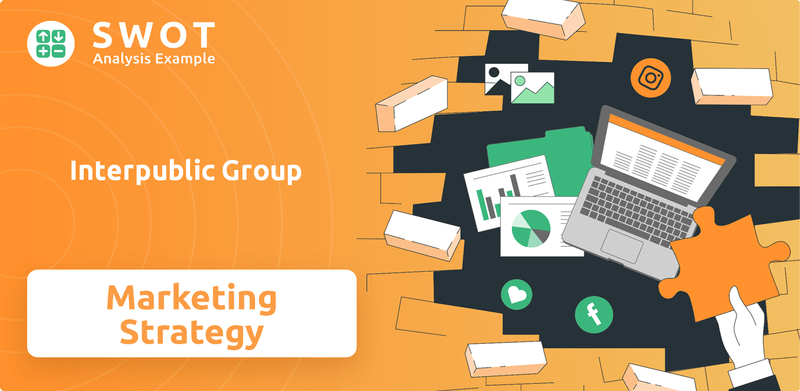
This deep dive explores how Interpublic Group crafts its services, innovative marketing tactics, and its competitive positioning. From traditional advertising to advanced digital marketing, IPG's approach, including its media buying strategies, is a masterclass in adaptation. We'll examine how Interpublic Group approaches sales and its recent successes in the industry, offering valuable insights for anyone interested in sales and marketing strategies for advertising agencies.
How Does Interpublic Group Reach Its Customers?
The core of the Interpublic Group's (IPG) sales strategy revolves around a direct sales model. It leverages its extensive network of agencies and specialized marketing services to engage clients worldwide. This approach is crucial for the company's ability to offer tailored solutions and maintain direct relationships with its diverse client base.
IPG’s sales channels are primarily its agency brands, which include FCB, IPG Mediabrands, McCann Worldgroup, and MullenLowe Group. These agencies serve as the primary points of contact for clients, offering a wide range of services from traditional advertising to digital marketing and public relations. This diversified portfolio enables IPG to cater to various client needs across different industries and geographies.
The evolution of IPG's sales channels has been marked by a significant strategic shift towards digital adoption and omnichannel integration. Historically, the focus would have been on traditional media buying and creative development. However, in response to digital transformation, IPG has heavily invested in digital marketing services, data analytics, and consulting services.
IPG primarily uses a direct sales model, relying on its agencies to engage clients directly. This approach allows for personalized service and strong client relationships. The direct model is essential for understanding and meeting the specific needs of diverse clients, from multinational corporations to startups.
IPG's sales strategy is executed through its extensive network of agencies, including FCB, IPG Mediabrands, McCann Worldgroup, and MullenLowe Group. These agencies act as key sales channels, providing a wide array of marketing services. This diversified network ensures comprehensive coverage and specialized expertise.
IPG has strategically shifted towards digital adoption and omnichannel integration. This includes significant investments in digital marketing services, data analytics, and consulting. The acquisition of data solutions provider Acxiom in 2018 enhanced its consumer data capabilities, providing a competitive edge.
IPG forms strategic alliances with major tech and digital marketing platforms like Google Cloud, Meta (Facebook), and Adobe. Collaborations with media outlets such as NBCUniversal and Spotify expand its reach. In 2023, IPG invested $450 million in data analytics and marketing technology to enhance integrated solutions.
IPG's sales strategy is multifaceted, focusing on direct sales, agency networks, and strategic partnerships. The company’s approach emphasizes digital transformation and data-driven marketing to stay competitive. This comprehensive strategy helps IPG maintain its position in the advertising and marketing industry.
- Direct Sales: Leveraging agencies for client engagement.
- Agency Network: Utilizing diverse agencies for comprehensive service offerings.
- Digital Adoption: Investing in digital marketing and data analytics.
- Strategic Partnerships: Collaborating with tech and media platforms.
Interpublic Group SWOT Analysis
- Complete SWOT Breakdown
- Fully Customizable
- Editable in Excel & Word
- Professional Formatting
- Investor-Ready Format
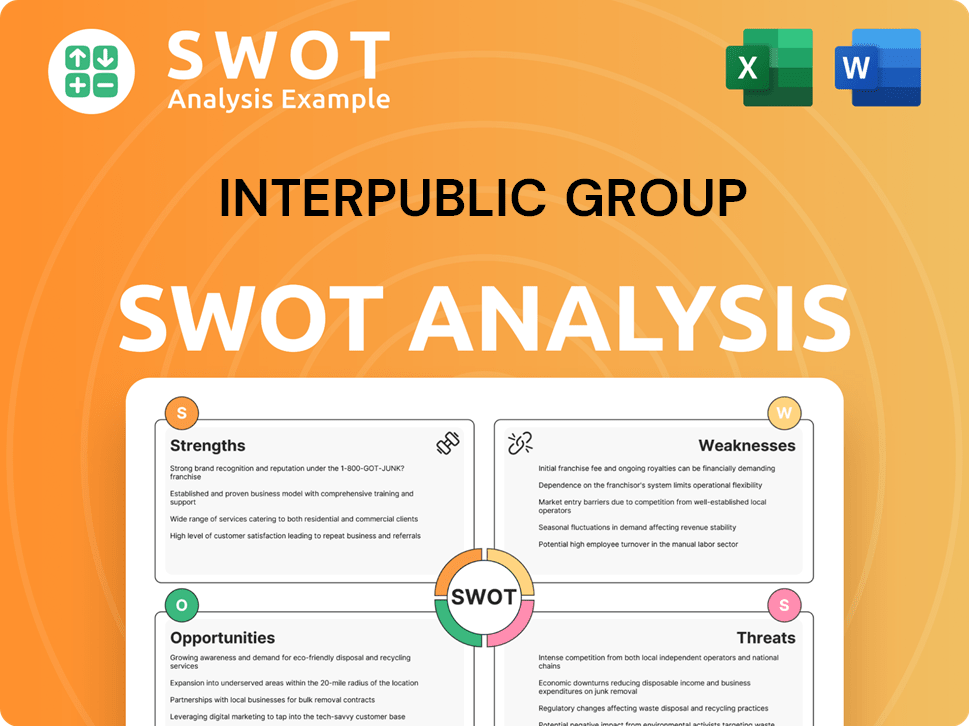
What Marketing Tactics Does Interpublic Group Use?
The marketing tactics employed by Interpublic Group (IPG) are multifaceted, blending digital and traditional approaches to boost awareness, generate leads, and drive sales for its diverse clientele. This comprehensive strategy includes content marketing, data-driven initiatives, and innovative platforms to stay ahead in the dynamic advertising landscape. The company's focus on digital transformation and strategic acquisitions highlights its commitment to evolving marketing practices.
IPG's approach to marketing is deeply rooted in data analytics and customer segmentation. The company invests heavily in marketing technology and proprietary solutions, including AI-driven tools. Recent developments, such as the 'Interact' platform and the 'Culture Decoder' tool, demonstrate IPG's commitment to innovation and leveraging technology to enhance marketing performance.
IPG's marketing strategy is designed to provide comprehensive solutions for its clients, focusing on both traditional and digital channels. This approach allows IPG to offer integrated marketing communications and cater to the evolving needs of its clients. The company's commitment to innovation and data-driven insights ensures its ability to remain competitive in the advertising industry.
Digital marketing is a core component of IPG's strategy. In 2023, the digital marketing segment generated $4.2 billion in revenue, representing 44.7% of its total revenue. This strong performance underscores the importance of digital strategies in the company's overall approach.
IPG heavily invests in data analytics and marketing technology to drive its marketing efforts. The Mediabrands Intelligence platform processes over 500 terabytes of data annually. The acquisition of Intelligence Node in December 2024, valued at approximately $100 million, strengthened its data analytics capabilities.
IPG continuously innovates with new platforms and tools. The 'Interact' platform, announced in October 2024, integrates various resources to improve marketing performance. Huge's 'Culture Decoder', launched in February 2024, uses AI to analyze cultural trends.
Despite the shift to digital, IPG still offers media planning and buying services across traditional channels. Traditional media accounted for $1.2 billion (33%) of its media spend in 2023, showing a balanced approach.
Content marketing plays a key role in attracting and educating potential clients. IPG utilizes thought leadership articles, case studies, and white papers as part of its content strategy. This helps establish expertise and build brand awareness.
IPG's client acquisition strategy involves a combination of digital and traditional methods. Data analytics and customer segmentation are critical for identifying and targeting potential clients effectively. The company's integrated marketing communications approach ensures a cohesive brand message.
IPG's marketing strategy is characterized by a blend of digital and traditional tactics, emphasizing data-driven insights and innovative platforms. This approach allows the company to offer comprehensive solutions to its clients, ensuring they can adapt to the changing advertising landscape. For a deeper dive into IPG's financial structure and business model, consider reading about the Revenue Streams & Business Model of Interpublic Group.
- Digital Marketing: Focus on content marketing, social media campaigns, and digital transformation projects.
- Data Analytics: Utilizing platforms like Mediabrands Intelligence and acquisitions like Intelligence Node for consumer behavior tracking and real-time insights.
- Innovation: Developing platforms such as 'Interact' and tools like 'Culture Decoder' to enhance marketing performance and understand cultural trends.
- Traditional Media: Continuing to provide media planning and buying services across traditional channels to maintain a balanced approach.
- Customer Segmentation and Personalization: Tailoring marketing efforts based on data-driven insights to connect with target audiences effectively.
Interpublic Group PESTLE Analysis
- Covers All 6 PESTLE Categories
- No Research Needed – Save Hours of Work
- Built by Experts, Trusted by Consultants
- Instant Download, Ready to Use
- 100% Editable, Fully Customizable
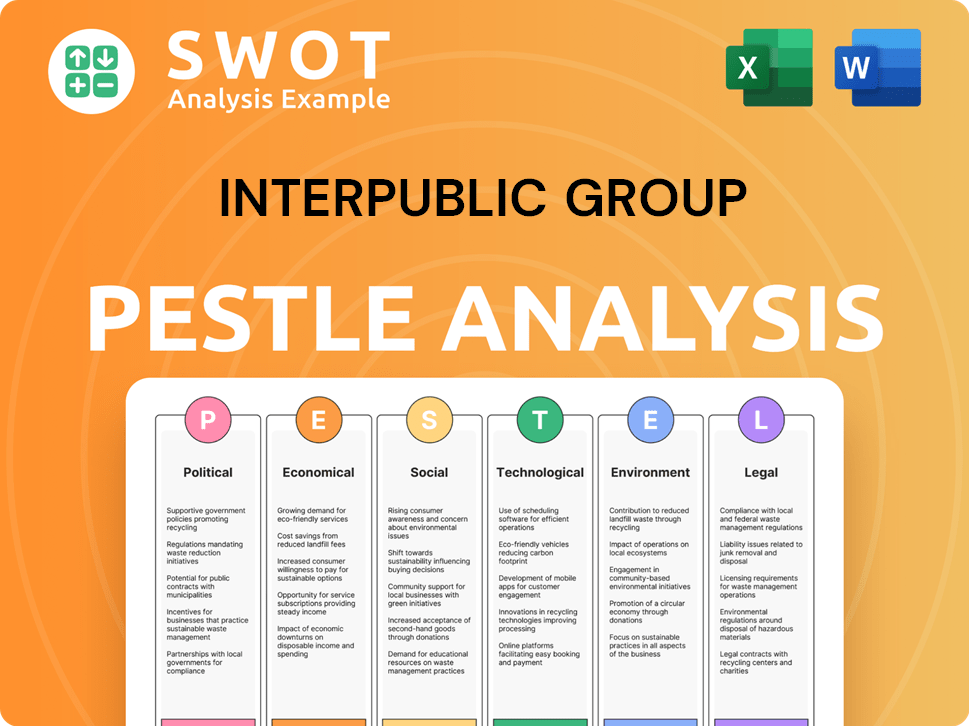
How Is Interpublic Group Positioned in the Market?
Interpublic Group (IPG) positions itself as a values-driven, data-fueled, and creatively-led provider of marketing solutions. This approach differentiates IPG by emphasizing an integrated strategy and a deep understanding of audiences at the individual level. The core message focuses on delivering innovative and impactful communication strategies, driving business growth, and fostering brand loyalty for its clients.
IPG's visual identity and tone reflect its commitment to creativity and collaboration, aiming to provide comprehensive marketing solutions that transcend traditional boundaries. The company's focus is client-centric, ensuring tailored marketing strategies and integrated solutions for a diverse clientele. This includes large enterprises, small and medium businesses, non-profit organizations, government agencies, and startups.
The company's appeal stems from its ability to combine creative genius, technological innovation, and data-driven insights to optimize campaign outcomes. IPG's continuous investments in consumer data accumulation and analysis, particularly through its Acxiom unit, give it a durable competitive advantage in understanding consumer behavior and delivering personalized experiences. For more information on the ownership structure, you can read about Owners & Shareholders of Interpublic Group.
IPG's sales strategy emphasizes building strong client relationships and providing tailored marketing solutions. This approach focuses on understanding each client's unique needs and offering integrated services to drive growth. The company leverages its diverse agency network to offer specialized expertise, from advertising to digital marketing, ensuring comprehensive support for clients.
The marketing strategy for IPG centers on promoting its integrated marketing capabilities and data-driven insights. IPG highlights its ability to combine creative excellence with technological innovation to deliver measurable results. The company focuses on thought leadership and showcasing successful marketing campaign examples to attract new clients and retain existing ones.
IPG's competitive advantage lies in its integrated approach, data analytics capabilities, and diverse agency network. The company's investment in consumer data, particularly through Acxiom, allows for deeper insights into consumer behavior. This enables IPG to deliver highly targeted and effective marketing campaigns. The company's focus on innovation, including AI and retail media, further strengthens its position.
IPG's digital marketing strategy is centered on leveraging data analytics, personalization, and innovative technologies. The company focuses on creating engaging content, optimizing campaigns across various digital channels, and measuring performance to drive ROI. IPG's approach includes social media marketing, search engine optimization, and content marketing to reach target audiences effectively.
IPG's client acquisition strategy involves a multi-faceted approach, including direct sales, referrals, and thought leadership. The company actively participates in industry events and publishes research to attract new clients. IPG also focuses on building long-term relationships with existing clients to secure repeat business and expand its service offerings.
Data analytics plays a crucial role in IPG's marketing strategy, enabling data-driven decision-making and campaign optimization. The company uses data to understand consumer behavior, personalize marketing messages, and measure campaign effectiveness. IPG's investment in data analytics provides a competitive edge in delivering targeted and impactful marketing solutions.
IPG's media planning process involves a strategic approach to selecting and managing media channels to maximize campaign reach and impact. This includes media buying, channel optimization, and performance tracking. The company leverages its expertise in media planning to ensure clients' campaigns are seen by the right audiences at the right time.
Integrated marketing communications is a core component of IPG's strategy, ensuring consistent messaging and brand experience across all touchpoints. This involves aligning various marketing activities, including advertising, public relations, and digital marketing, to achieve a unified campaign objective. IPG's integrated approach enhances brand awareness and drives customer engagement.
IPG's public relations strategy focuses on building and maintaining a positive brand image and reputation. This includes managing media relations, crisis communications, and thought leadership initiatives. The company's PR efforts aim to enhance brand credibility and build trust with key stakeholders.
IPG's global marketing reach is supported by its extensive network of agencies across various regions. This allows the company to offer localized marketing solutions and adapt to regional market dynamics. IPG's global presence enables it to serve multinational clients effectively and deliver consistent brand experiences worldwide.
Interpublic Group Business Model Canvas
- Complete 9-Block Business Model Canvas
- Effortlessly Communicate Your Business Strategy
- Investor-Ready BMC Format
- 100% Editable and Customizable
- Clear and Structured Layout
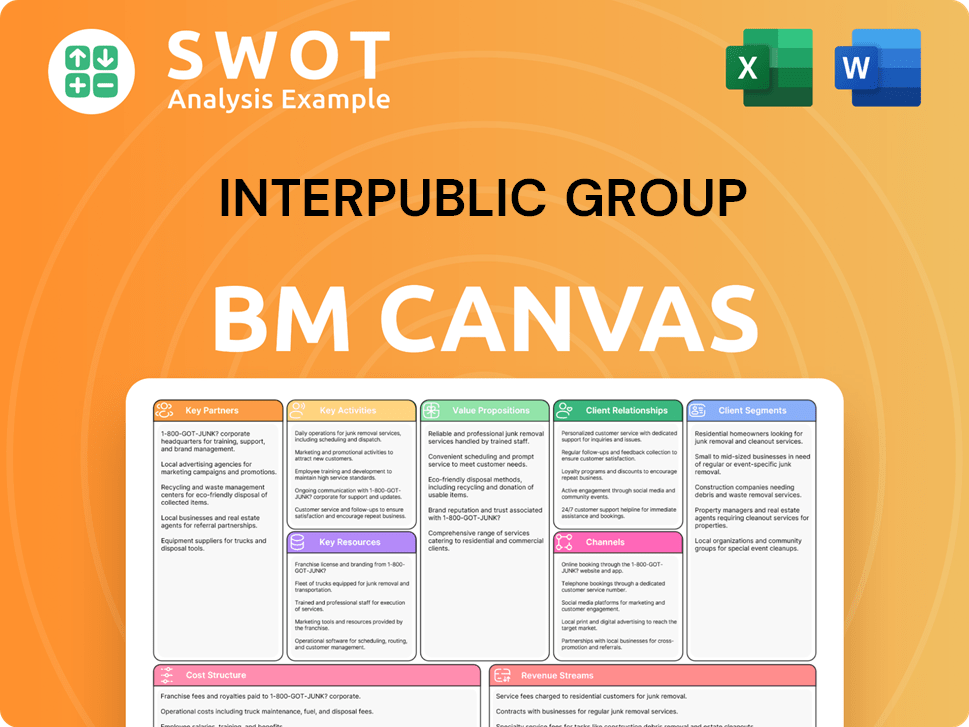
What Are Interpublic Group’s Most Notable Campaigns?
As a global marketing and advertising solutions provider, the key 'campaigns' of Interpublic Group (IPG) are often the integrated marketing efforts it develops and executes for its clients. These campaigns leverage the diverse portfolio of agencies within IPG. However, IPG also defines its own brand and drives growth through strategic initiatives and technological advancements which also serve as 'campaigns'.
IPG's strategic focus on data-driven marketing and AI integration is a defining 'campaign'. This initiative underscores IPG's commitment to innovation and delivering personalized customer experiences at scale. Further, its ongoing development of the 'Interact' platform and its strategic expansion into the retail media sector through acquisitions, highlight IPG's commitment to enhancing its offerings.
The company's approach to its sales strategy and marketing strategy is multifaceted, involving both client-specific campaigns and internal initiatives. These initiatives are designed to enhance its capabilities and expand its market presence. The company's strategic moves are a response to the evolving advertising landscape, positioning IPG to tap into new revenue streams and maintain its competitive advantage in the industry.
IPG's partnership with Adobe, announced in February 2024, is a key campaign. It focuses on integrating Adobe GenStudio to speed up content creation and activation through generative AI. This initiative aims to streamline the end-to-end customer experience, enabling brands to engage audiences more effectively.
The 'Interact' platform, announced in October 2024, unifies IPG's data, engineering, martech, and adtech resources. Built on consumer insights from Acxiom and Real ID, it drives better marketing performance in real time. It has been instrumental in recent new business wins for IPG.
IPG's acquisition of Intelligence Node in December 2024 for approximately $100 million highlights its expansion into retail media. This acquisition enhances its data analytics capabilities and offers more comprehensive services to retail clients. This move is a direct response to the evolving advertising landscape.
While specific client campaigns are proprietary, these integrated marketing efforts are core to IPG's business. These campaigns are developed and executed across IPG's diverse portfolio of agencies. They drive growth and brand recognition for both IPG and its clients.
IPG's marketing strategy and sales strategy are closely intertwined, focusing on innovation, data-driven insights, and client-centric solutions. These strategies are crucial for maintaining a competitive edge and driving growth.
- Data and AI Integration: Enhances content creation and personalization.
- 'Interact' Platform: Improves real-time marketing performance and client targeting.
- Retail Media Expansion: Capitalizes on the growth in retail advertising.
- Client-Specific Campaigns: Deliver tailored marketing solutions.
Interpublic Group Porter's Five Forces Analysis
- Covers All 5 Competitive Forces in Detail
- Structured for Consultants, Students, and Founders
- 100% Editable in Microsoft Word & Excel
- Instant Digital Download – Use Immediately
- Compatible with Mac & PC – Fully Unlocked
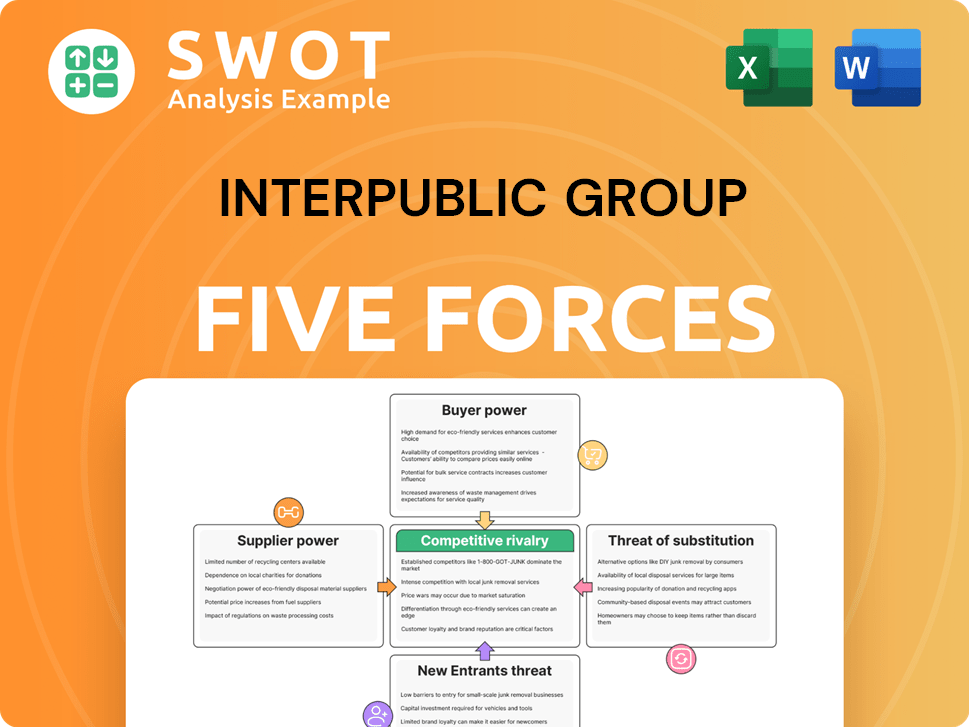
Related Blogs
- What are Mission Vision & Core Values of Interpublic Group Company?
- What is Competitive Landscape of Interpublic Group Company?
- What is Growth Strategy and Future Prospects of Interpublic Group Company?
- How Does Interpublic Group Company Work?
- What is Brief History of Interpublic Group Company?
- Who Owns Interpublic Group Company?
- What is Customer Demographics and Target Market of Interpublic Group Company?
Disclaimer
All information, articles, and product details provided on this website are for general informational and educational purposes only. We do not claim any ownership over, nor do we intend to infringe upon, any trademarks, copyrights, logos, brand names, or other intellectual property mentioned or depicted on this site. Such intellectual property remains the property of its respective owners, and any references here are made solely for identification or informational purposes, without implying any affiliation, endorsement, or partnership.
We make no representations or warranties, express or implied, regarding the accuracy, completeness, or suitability of any content or products presented. Nothing on this website should be construed as legal, tax, investment, financial, medical, or other professional advice. In addition, no part of this site—including articles or product references—constitutes a solicitation, recommendation, endorsement, advertisement, or offer to buy or sell any securities, franchises, or other financial instruments, particularly in jurisdictions where such activity would be unlawful.
All content is of a general nature and may not address the specific circumstances of any individual or entity. It is not a substitute for professional advice or services. Any actions you take based on the information provided here are strictly at your own risk. You accept full responsibility for any decisions or outcomes arising from your use of this website and agree to release us from any liability in connection with your use of, or reliance upon, the content or products found herein.